Reviews
Maggie Greenwald
USA, 1993
Credits
Review by Cullen Gallagher
Posted on 17 August 2009
Source New Line Home Video DVD
Categories Women of the West
At the very start of The Ballad of Little Jo, Josephine Monaghan finds herself caught in the dichotomous, reactionary web of nineteenth century American morality. Pregnant out of wedlock, her family takes possession of her child and sends her packing. On the road, a traveling salesman picks her up, seemingly engaging her as his assistant only to pawn her off to a couple of violent cowboys who chase her deep into the woods. Escaping, she flees to a local shop but finds hostility instead of sanctuary. Good girls would never get themselves in such a fix, it seems. When Josephine holds a pair of men’s trousers up in front of the mirror, the female shopkeeper warns, “Its against the law to dress improper to your sex.” Rejecting society’s label of “whore” because she wasn’t their idea of a “saint,” Josephine’s only recourse is the ultimate transgression: to cross the gender divide itself, from “Josephine” to “Jo.”
Director Maggie Greenwald visualizes this decisive moment through a near-cubist composition: Josephine is looking at a series of mirrors, one of which reflects her body (with the man’s trousers held up), another just her face, and a third off to the side that reflects the embittered, grayed female shopkeeper. This older woman represents not only the conservative majority that holds Josephine down, but also the future that awaits her should she play by society’s rules. And the way things are going, Josephine probably wouldn’t even reach the level of independence that this woman has. Like a crystal ball, the mirrors showed two possible paths: one of certain, repressed doom, the other of uncertain possibility. Josephine chose the latter.
Initially a disguise to escape capture, Jo’s disguise increasingly becomes a permanent and inescapable part of her personality. Moving out west to a small mining community, Jo’s odd jobs and acquaintances culminate in the iconic gesture of Manifest Destiny-associated freedom: homesteading on the open range. But even there, Jo discovers her guard can never be let down, lest the secret of Josephine is unleashed.
Just as Jo’s character must slowly adapt to her new persona — voice, gesture, stride, habits — so too much the actor, Suzy Amis. There’s an adolescent uncertainty as she rebuilds her identity (much as teenagers do during turbulent years): her shaky, forcefully low voice belies her inner insecurity, and she relies on social acknowledgement to reinforce her own conceptions of who she really is. Her actions and demeanor are all judged by her peers, both male and female. After young Mary (a twenty-three year old Heather Graham) blushes in Jo’s presence and rumors arise about a possible courtship between the two, Jo’s gender is confirmed around town.
Even as a man, she can’t escape certain gender binding preconceptions, particularly when it comes to sex. When Jo refuses to get excited over a prostitute, she is warned, “A man can get diseases he don’t do it regular.” Jo’s disinterest prompts the friendship of Corcoran (subtly and ambiguously played by Ian McKellan), seemingly a kindred loner whose violent contempt for women is a sign of his repressed homosexuality (which goes both unacknowledged and unrequited by his character). Ironically, the only man to ever truly accept her masculine mask is the one who discovers her real identity: Tinman Wong, a Chinese migrant worker who begins as Jo’s cook and ends up her companion and lover. He marginalized by race and she by gender, together they find a unique sympathy that the rest of the world would never condone and could never offer.
Prior to The Ballad of Little Jo, Maggie Greenwald directed a criminally underrated adaptation of Jim Thompson’s The Kill Off, whose circular narrative presented a particular challenge: how to translate its structure of alternating narrators cinematically? One can sense a similar interest in innovate structures with The Ballad of Little Jo, which while on “true characters” (according to the credits) is an original screenplay by Greenwald. “Ballad” is entirely appropriate, as its narrative progresses like the verses of a song. There is no central villain or action at the center of this plot; instead, it is the gradual revealing of a character through fragments of their life. And while it may break with tradition (particularly in terms of characterization) I’d hesitate to slap the “revisionist” label on the film. Like Jo herself, Greenwald seems less interested in changing the past than in lighting out on her own and carving a distinct and personal space for herself, something she admirably accomplishes. As once of the few examples of a Western with a female director, it certainly charts new territory in more ways than one, but it is to Greenwald’s credit that The Ballad of Little Jo will neither alienate fans of traditional Westerns or those unfamiliar with the genre, but ultimately appeals beyond any niche audience.
More Women of the West
-

49-17
1917 -
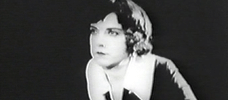
The Gun Woman
1918 -
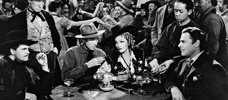
Destry Rides Again
1939 -
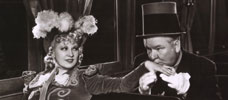
My Little Chickadee
1940 -
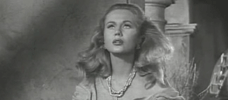
Colorado Territory
1949 -
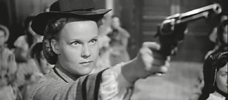
Westward the Women
1951 -
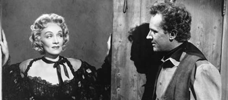
Rancho Notorious
1952 -
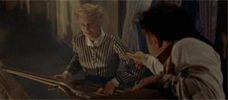
The Violent Men
1955 -
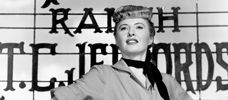
The Furies
1950 -
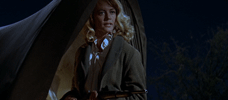
The Last Sunset
1961 -

The Misfits
1961 -
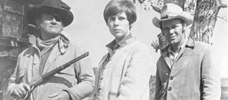
True Grit
1969 -

Hannie Caulder
1971 -

Rooster Cogburn
1975 -

McCabe & Mrs. Miller
1971 -

The Ballad of Little Jo
1993 -

The Quick and the Dead
1995 -

Viva Maria!
1965 -

Two Mules for Sister Sara
1970
We don’t do comments anymore, but you may contact us here or find us on Twitter or Facebook.



